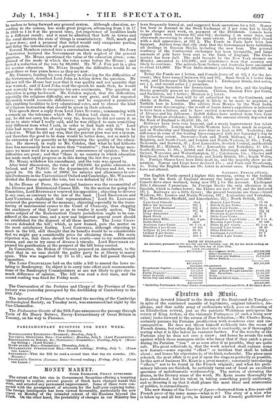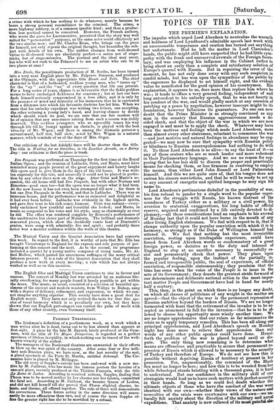4ratrro nub Vuoir.
Having devoted himself to the drama of the Boulevard du Temple,- in spite of the continued assaults of legitimists, original talentites, An- glicans, and that noble army of enthusiasts which goes on dreaming of an Elizabethan revival, just as the patriotic Welshman anticipates the return of King Arthur, or the visionary Portuguese (if such a being now exists) looks forward to the return of Don Sebastian,-Mr. Charles Kean, certainly pursues his Parisian predilection with wondrous care and cir- cumspection. He does not throw himself recklessly into the ocean of French drama, but rather dips his foot into it cautiously, as if thoroughly testing what it is like before he ventures further. For the novelty of the Parisian play he does not care a straw ; and hence he avoids the rock against which those managers strike who fancy that if they catch a piece during its Parisian " run " or as soon after it as possible, they are quite safe. His great solicitude is, that the work selected shall contain some new feature-some especial "effect" or incident that shall be talked about ; and hence his repertoire is, of its kind, recherche. The piece once selected, the next affair is to put it upon the stage as perfectly as possible. In this sort of business Mr. Kean is a great master; constantly introducing "effects" not to be found in the French original; and when his preli- minary labours are finished, he certainly turns out of hand an excellent specimen of melodramatic workmanship. The notion of elevating the drama, in the literary sense of the word, Mr. 4ean seems thoroughly to have abandoned ; but his talent in taking something purely unliterary, and so dressing it up that it shall please 'the most blasé and aristocratic of publics, is extraordinary. The new drama of the Courier of Lyons-borrowed from a five-year-old French piece of the same name-what is it ? The story of a man who is taken up and all but (quite, in history and in French) guillotined for a crime with which he has nothing to de whatever, merely because he bears a strong personal resemblance to the criminal. The crime, a mere highway robbery, is of a common ignoble kind ; and thus a produc- tion less poetical cannot be conceived. However, the French authors, who wrote the piece for Lacressoniere, perceived that the story was well suited for "personation" purposes, as the same actor could effectively act the two similar men; and Mr. Charles Kean, who brings out the piece for himself, not only repeats the original thought, but beautifies the sub- ject with details of his own. The sudden changes from well-dressed virtue to ill-dressed vice are absolutely perfect—a series not of stage- ticks, but of stage-miracles. The poetical and the ideal may sneer, but who will not rush to the Princess's to see an artist who can be in two places at once?



































 Previous page
Previous page